【Environment】 Promotion of Climate Change Countermeasures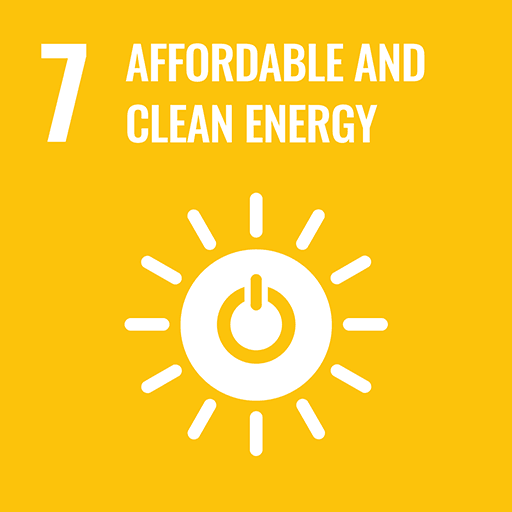
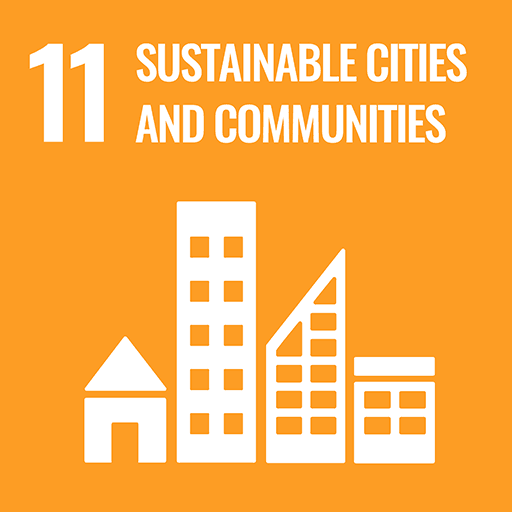
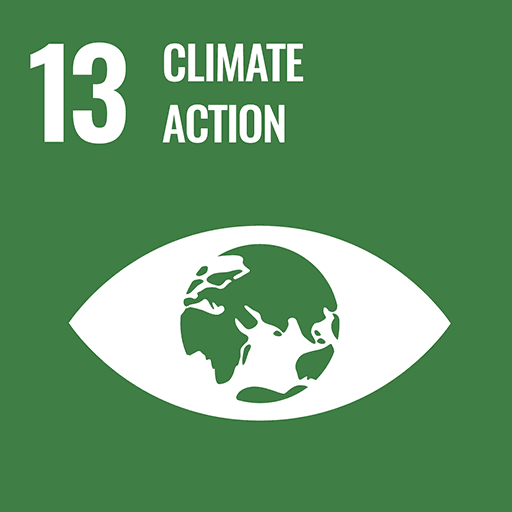
We will contribute to realizing a decarbonized society by working to reduce CO2 emissions from our business operations as well as our reinsurance underwriting and asset management.
Climate-related Financial Disclosure
Climate change poses a threat to the safety and security of society, including the intensification of natural catastrophe, and addressing it is a critical challenge for the whole world.
Addressing climate change is also one of the greatest challenges inevitable for the Toa Re Group, which upholds the mission of “Providing Peace of Mind,” as articulated in the Toa Re Mission Statement, through providing long-term and stable reinsurance capacity for natural catastrophe risk.
Therefore, the Group has been working to contribute to the transition toward a decarbonized society by working to reduce CO2 emissions from our business operation as a business entity, in addition to various initiatives in its core reinsurance business and asset management.
Governance
The climate-related governance structure of the Group consists of the Board of Directors, the SDGs/ESG Committee, and the ERM Committee.
- The Board of Directors discusses and establishes our Group-wide policy related to sustainability encompassing its initiatives for addressing climate change and various plans related primarily to the promotion of climate change countermeasures, and also monitors the status of such initiatives. Non-financial indicators related to sustainability-related initiatives are incorporated into the performance-linked remuneration of Directors and Audit & Supervisory Board Members (excluding outside Directors and outside Audit & Supervisory Board Members).
- The SDGs/ESG Committee is chaired by the Executive Officer in charge of the Communication & Coordination Department, which is the sustainability promotion department, and consists of the General Managers of related departments. The matters discussed by the Committee and the progress of sustainability measures are received periodically and resolved by the Board of Directors as appropriate. In fiscal 2024, progress of initiatives under the medium-term management plan “KIZUNA 2026”, as well as the Group's various initiatives to reduce CO2 emissions, sustainability-related disclosures, and internal awareness-raising measures were discussed at the Committee.
- The ERM Committee is chaired by an Executive Officer appointed by the Executive Officer in charge of the Management Planning Department after the discussions at the Executive Management Committee established to discuss important matters concerning overall management, and consists of the General Managers of related departments. It discusses various matters related to enterprise risk management (ERM) for the Group. Material matters concerning risk management, including climate change, are reported to the Board of Directors periodically.
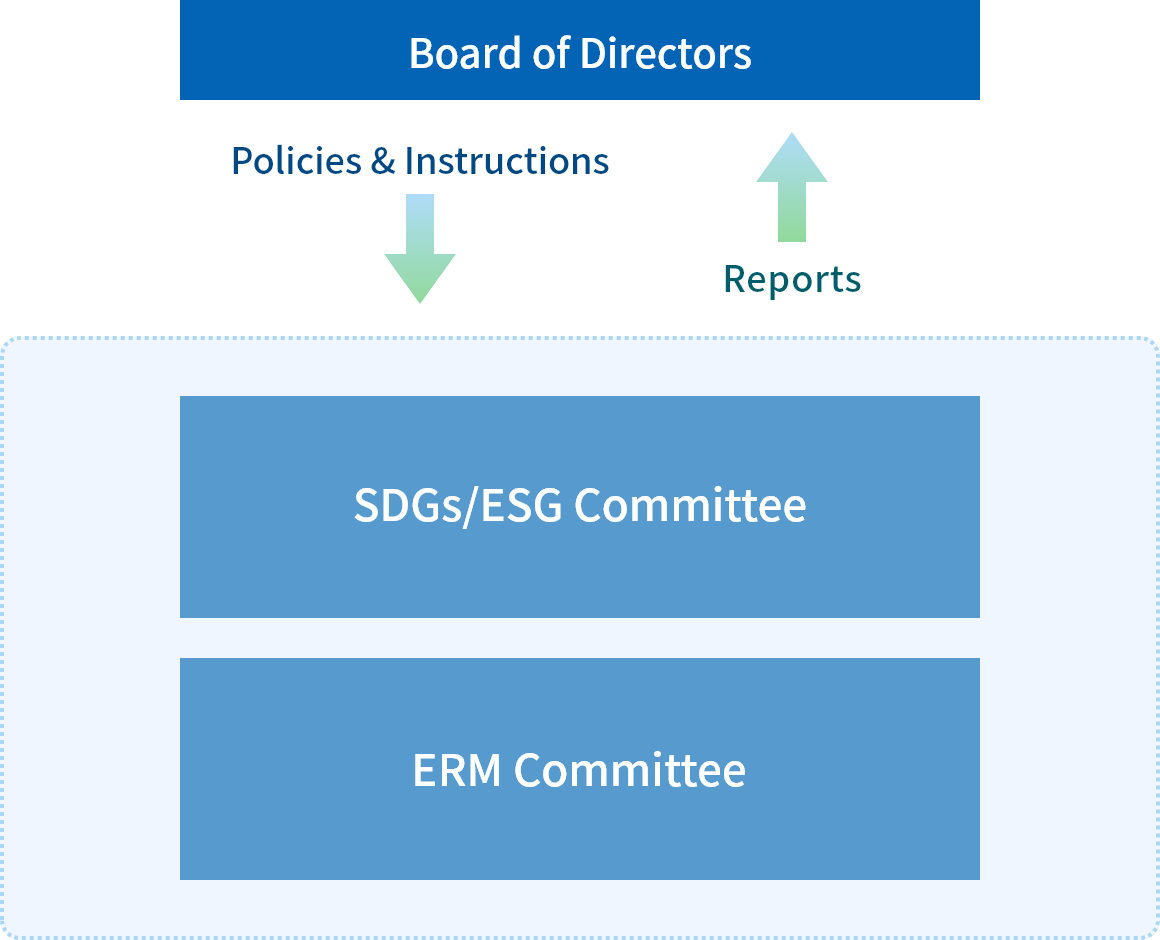
In addition, in December 2024, a workshop lectured by external specialist, concerning sustainability including climate change, was held with the participation of the executives and staff of the head office, in order to improve their knowledge on sustainability.
Strategies
The Group recognizes the following climate-related risks and opportunities.
| Classification | Events and risks/opportunities to the Group | Time frame |
|---|---|---|
| Physical Risks |
|
Short to medium term |
|
Long term | |
| Transition Risks |
|
Medium to long term |
|
Short to long term | |
| Opportunities |
|
Short to long term |
The Group takes appropriate measures to address each of the above climate-related risks and opportunities based on the degree of impact entailed by each individual risks and opportunities. In particular, we recognize that the impact of natural catastrophe, a physical risk related to non-life reinsurance, is a significant threat from the perspective of business continuity in the Group, as mentioned above. Therefore, we are taking the following measures towards the realization of a decarbonized society.
(1) Initiatives in the Reinsurance Business
From the perspective of promoting the transition toward a decarbonized society, as a rule, we do not engage in facultative reinsurance transactions related to newly planned coal-fired power plants and coal mining business (thermal coal). We will contribute to solving the social challenge of climate change through our reinsurance business, including reorganizing our reinsurance portfolio by screening clients and contracts, and research and study activities related to the renewable energy business.
(2) Initiatives in Asset Management
In addition to management aimed at improving the risk/return of the portfolio held on a long-term and stable basis, we also manage our investment portfolio in consideration of public and social nature in accordance with the Group ESG investment policy.
When executing an investment, we obtain ESG (Environmental, Social, and Governance) information on candidate companies to determine whether or not to invest. From the perspective of promoting the transition toward a decarbonized society, as a rule, we do not make any new investments related to coal-fired power plants or coal mining businesses (thermal coal). In addition, as part of our efforts to promote climate change countermeasures, we will contribute to the transition toward a decarbonized society, which is proceeding on a global scale, by investing in green bonds and other such investments.
(3) Initiatives to Reduce CO2 Emissions in Operations
By supporting the transition toward a decarbonized society through our business activities, we will contribute to curbing global warming. Specifically, we are promoting power conservation and are switching to electricity derived from renewable energy sources. We will continue to promote various measures to reduce CO2 emissions, including the introduction of renewable energy on a group-wide basis.
As part of our social contribution and global environment protection activities, we also conduct environmental awareness-raising activities, such as donating environment-related books to local elementary schools and co-hosting a series of lectures on environmental issues with the General Insurance Institute of Japan, a public interest incorporated foundation. Going forward, we will consider new environmental awareness-raising activities.
Risk management
The Group conducts ERM,(refer to "Risk Management Structure and Procedures" and "ERM-based business Operation (Risk Appetite Framework)") , which includes the management of climate-related risks, using both qualitative and quantitative approaches.
For qualitative management, we regularly identify and evaluate risks in order to accurately define the risk profile and material risks of the entire Group, which are then listed in a risk register together with countermeasures.
In terms of quantitative management, natural catastrophe risks such as typhoons, which are greatly affected by climate change, are managed by measuring the amount of risk at the level of once every 250 years, and setting a limit for such risks from the standpoint of ensuring our financial soundness.
In addition, we evaluate business continuity in the extreme events such as unprecedented large typhoons or large-scale floods through conducting stress tests.
Metrics and targets
The Group has set medium- to long-term targets of achieving a 50% reduction in CO2 emissions in fiscal 2030 relative to those of fiscal 2019(*), and carbon neutrality by fiscal 2050(*). In addition, as metrics for achieving the targets, we have set renewable electricity use at 70% or more in fiscal 2030 and 100% in fiscal 2050 at our group's all facilities. To reach these targets, we are promoting various initiatives to reduce CO2 emissions, including using renewable electricity at group facilities. Renewable electricity has already been introduced at the head office and The Toa 21st Century Reinsurance Co. Ltd., and in fiscal 2024, it was also introduced at Kuala Lumpur Branch and Hong Kong Branch.
For each of the initiatives in promoting the transition toward a decarbonized society in the reinsurance business and in asset management, we have set specific targets and have been promoting activities to achieve them.
(*) Based on measurement in accordance with GHG protocols.
Environmental Performance Data
From the perspective of promoting environmental protection, including climate change countermeasures, the Group has set medium- to long-term targets of achieving a 50% reduction in CO2 emissions in fiscal 2030 relative to those of fiscal 2019, and carbon neutrality by fiscal 2050.
In addition, as metrics for achieving the targets, the Group has set renewable electricity use at 70% or more in fiscal 2030 and 100% in fiscal 2050 at the Group’s all facilities.
The measurement results of the Group's CO2 emissions and environmental load data are as follows. In fiscal 2024, the Group has reduced CO2 emissions by 53.2% compared to fiscal 2019, with 74.1% of renewable electricity usage.
1. Measurement results
(1) CO2 emissions
| Units | Fiscal 2019 (Base year) |
Fiscal 2022 | Fiscal 2023 | Fiscal 2024 | ||
|---|---|---|---|---|---|---|
| Scope 1 | Direct emissions | t-CO2 | 157 | 187 | 181 | 178 |
| Scope 2 | Indirect emissions | t-CO2 | 989 | 353 | 346 | (*3) 188 |
| Scope 3 | total | t-CO2 | 623 | 297 | 364 | 463 |
| Category 1 | t-CO2 | 25 | 11 | 11 | 9 | |
| Category 3 | t-CO2 | 165 | 152 | 156 | 153 | |
| Category 5 | t-CO2 | 2 | 1 | 1 | 1 | |
| Category 6 | t-CO2 | 335 | 66 | 124 | 229 | |
| Category 7 | t-CO2 | 97 | 68 | 72 | 71 | |
| Scope 1-3 total | t-CO2 | 1,769 | 837 | 891 | 829 | |
(2) Renewable electricity usage
| Units | Fiscal 2022 | Fiscal 2023 | Fiscal 2024 | |
|---|---|---|---|---|
| Renewable electricity usage rate | % | 60.9 | 61.9 | 74.1 |
| Renewable electricity usage | kWh | 1,273,554 | 1,288,319 | 1,484,474 |
(3) Environmental load data
| Units | Fiscal 2019 | Fiscal 2022 | Fiscal 2023 | Fiscal 2024 | |
|---|---|---|---|---|---|
| Electricity usage | kWh | 2,226,688 | 2,090,834 | 2,079,978 | 2,003,090 |
| City gas usage | N㎥ | 48,653 | 57,153 | 54,280 | 50,243 |
| Propane gas usage | ㎥ | 6,184 | 5,198 | 5,667 | 6,571 |
| Gasoline usage | ℓ | 5,020 | 7,298 | 8,573 | 9,121 |
| Kerosene usage | ℓ | 120 | 80 | 120 | 40 |
| Paper usage | t | 13 | 6 | 6 | 5 |
| Water usage | ㎥ | 7,577 | 6,262 | 6,234 | 6,384 |
| Waste generation | t | 33 | 23 | 23 | 22 |
2. Methods of calculation for CO2 emissions and environmental load data
◎ Coverage
| Coverage of data collection | |||
|---|---|---|---|
| CO2 emissions | Scope 1 | The Toa Reinsurance Group | |
| Scope 2 | The Toa Reinsurance Group | ||
| Scope 3 | Category 1 | The Toa Reinsurance Group | |
| Category 3 | The Toa Reinsurance Group | ||
| Category 5 | Toa Reinsurance Domestic Group Companies | ||
| Category 6 | The Toa Reinsurance Group | ||
| Category 7 | The Toa Reinsurance Group | ||
| Fuel usage | The Toa Reinsurance Group | ||
| Electricity usage (Including renewable electricity usage) | The Toa Reinsurance Group | ||
| Paper usage | The Toa Reinsurance Group | ||
| Water usage | Toa Reinsurance Domestic Group Companies | ||
| Waste generation | Toa Reinsurance Domestic Group Companies | ||
◎ CO2 emissions
| Calculation methods | Emission coefficients | ||
|---|---|---|---|
| Scope 1 Direct emissions | Fuel usage amounts of each environmental load data item × emission coefficient | Emission coefficient list provided by Ministry of the Environment, Government of Japan (*1) | |
| Scope 2 Indirect emissions | Electricity usage amounts of each environmental load data item × emission coefficient | Domestic: Emission coefficient for each electricity provider (*2) and Emission coefficient list provided by Ministry of the Environment, Government of Japan (*1) Overseas: Emission coefficient provided by IEA (*3) |
|
| Scope 3 | Category 1: Purchased goods and services |
Purchased paper amount ×emission coefficient | Emission coefficient database provided by Ministry of the Environment, Government of Japan (*4) |
| Category 3: Fuel and energy related activities not included in Scope 1 and 2 |
Fuel and electricity usage amounts of each environmental load data item × emission coefficient | Electricity: Emission coefficient database provided by Ministry of the Environment, Government of Japan (*4) Fuel: IDEA (*5) |
|
| Category 5: Waste generated in operations |
Waste generation amount × emission coefficient | Emission coefficient database provided by Ministry of the Environment, Government of Japan (*4) IDEA (*5) |
|
| Category 6: Business travel |
Business travel distance by air × emission coefficient | IDEA (*5) | |
| Category 7: Employee commuting |
Person-day of commuting ×emission coefficient (Person-day of commuting : Number of employees × average office attending days ratio) (*6) |
Emission coefficient database provided by Ministry of the Environment, Government of Japan (*4) | |
◎ Environmental load data
| Data | ||
|---|---|---|
| Fuel | City gas/propane gas usage amount | Gas usage amount in notification of gas provider |
| Gasoline usage amount | Domestic: Gasoline usage amount on the voucher of the gasoline provider Overseas: Calculated based on the distance driven to and from work and the fuel efficiency of the car |
|
| Kerosene usage amount | Kerosene usage amount on the invoice of the kerosene provider | |
| Electricity/Heat | Electricity usage amount Renewable electricity usage amount |
Electricity usage amount on the invoice of the electricity provider, etc. |
| Paper usage amount | Weight per package x number of purchases of paper (package) | |
| Water usage amount | The amount of water used on the invoice from the Bureau of Waterworks | |
| Waste generation amount | The amount of waste reported based on the Waste Management and Public Cleansing Act, etc. | |
Other Initiatives
Book Donations
Wishing to inspire children to take an informed interest in environmental issues, Toa Re donates books on environmental themes to the eight public elementary schools in Chiyoda-ku every year on Earth Day (April 22).
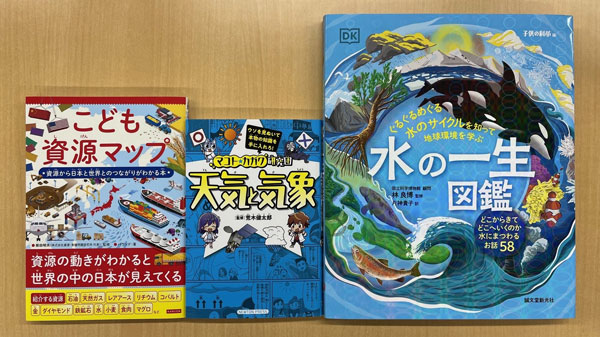
Lectures on Sustainability
To raise awareness of sustainability, Toa Re and the General Insurance Institute of Japan have been jointly holding a series of lectures on sustainability.
In fiscal 2025, Mr. Hiroyuki Morishita, Director, Planning and Coordination Division for Public Works, Policy Bureau, Ministry of Land, Infrastructure, Transport and Tourism (MLIT), was invited as a lecturer to an event held on October 16, 2025 under the theme of "Achieving Sustainable Infrastructure Maintenance" via a Zoom live stream.

SDGs/ESG Seminar
To deepen our employees’ knowledge of the SDGs/ESG, we held a seminar with Ms. Yuriko Chikusa of Asuene Inc. as a guest lecturer. Interspersed with explanatory videos, the seminar provided an excellent opportunity for attendees to learn about the ESG, the progression of global warming, the impact on the insurance industry, and other aspects of sustainability today and to reaffirm the importance of addressing the issues.

Promotion of Power Saving
Toa Re is working to reduce power consumption by implementing power saving promotion measures such as controlling the temperature of air-conditioning systems installed in offices, setting no overtime days, and using heat storage with midnight power. In fiscal 2024, we reduced power consumption by 1.4% compared to the previous year.
Adoption of Renewable Energy
At our head office and several of our overseas bases, we have adopted virtually CO2-free electricity that leverages the environmental value of renewable energy sources that do not emit CO2.
Donation through the Collection of PET Bottle Caps
As an initiative realized through the ideas of employees, Toa Re is supporting a system to make donations for medical assistance for developing countries through the collection of PET bottle caps. In fiscal 2024, we collected approximately 47,500 caps.